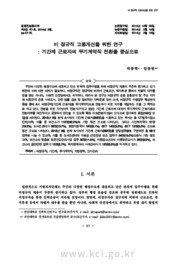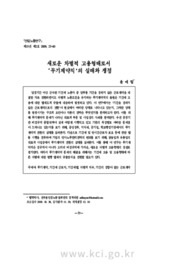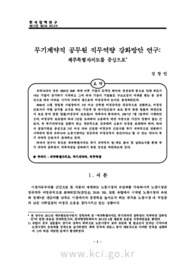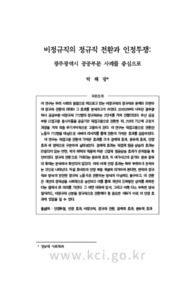

PARTNER
검증된 파트너 제휴사 자료
기간제 근로계약의 무기근로계약으로의 전환 (The conversion of fixed-term labor contract to permanent labor contract)
55 페이지
최초등록일 2025.06.25
최종저작일
2011.03
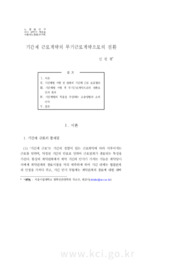
-
미리보기
서지정보
· 발행기관 : 서울대학교노동법연구회
· 수록지 정보 : 노동법연구 / 30호 / 197 ~ 251페이지
· 저자명 : 신권철
초록
The number of fixed-term employees in South Korea rose from 1.86 million in 2001 to 3.50 million in 2009. Korean labor law does not restrict the use of fixed-term contracts by prescribing reasons but restrict only maximum employment period. Employers do not need to justify the use of a fixed-term contract with reference to a legally prescribed reason.
Until The Act On The Protection Of Fixed-Term And Part-Time Employees(No. 8074, Dec. 21, 2006.)(hereafter the Act) is enacted in 2006, Some limitations have been introduced by the courts. Where a fixed-term contract is renewed and repeated, the fixed-term is declared null and void by the courts. In such cases, the fixed-term contract converts into a permanent contract and the employer is required to the reasonable cause of refusal to renewal.
The Act came into operation on 1 July 2007. The purpose of the Act is to promote a sound development of the labor market by redressing undue discrimination against fixed-term and part-time employees and strengthening the protection of their working conditions. The maximum employment duration of a fixed-term contract is 2 years with the exception provision of the Article 4 (1). Renewals of the fixed-term contract are possible within the maximum period. According to the Article 4 (2), if working duration of the fixed-term contract is continued beyond 2 years, the fixed-term contract automatically converts into a permanent contract.
This study is dealing with the issues on automatic conversion clause of the Article 4. In chapter 1, this study shows the present state of fixed-term employment in South Korea and surveys the decisions of the courts on the fixed-term employment in chapter 2. In chapter 3 and 4, this study analyzes several controversial issues in the automatic conversion clause of the Act. In conclusion, the proposal of this study is that the involuntary separation from labor which is formed by employer should be required the reasonable cause as dismissal.영어초록
The number of fixed-term employees in South Korea rose from 1.86 million in 2001 to 3.50 million in 2009. Korean labor law does not restrict the use of fixed-term contracts by prescribing reasons but restrict only maximum employment period. Employers do not need to justify the use of a fixed-term contract with reference to a legally prescribed reason.
Until The Act On The Protection Of Fixed-Term And Part-Time Employees(No. 8074, Dec. 21, 2006.)(hereafter the Act) is enacted in 2006, Some limitations have been introduced by the courts. Where a fixed-term contract is renewed and repeated, the fixed-term is declared null and void by the courts. In such cases, the fixed-term contract converts into a permanent contract and the employer is required to the reasonable cause of refusal to renewal.
The Act came into operation on 1 July 2007. The purpose of the Act is to promote a sound development of the labor market by redressing undue discrimination against fixed-term and part-time employees and strengthening the protection of their working conditions. The maximum employment duration of a fixed-term contract is 2 years with the exception provision of the Article 4 (1). Renewals of the fixed-term contract are possible within the maximum period. According to the Article 4 (2), if working duration of the fixed-term contract is continued beyond 2 years, the fixed-term contract automatically converts into a permanent contract.
This study is dealing with the issues on automatic conversion clause of the Article 4. In chapter 1, this study shows the present state of fixed-term employment in South Korea and surveys the decisions of the courts on the fixed-term employment in chapter 2. In chapter 3 and 4, this study analyzes several controversial issues in the automatic conversion clause of the Act. In conclusion, the proposal of this study is that the involuntary separation from labor which is formed by employer should be required the reasonable cause as dismissal.참고자료
· 없음태그
-
자주묻는질문의 답변을 확인해 주세요

꼭 알아주세요
-
자료의 정보 및 내용의 진실성에 대하여 해피캠퍼스는 보증하지 않으며, 해당 정보 및 게시물 저작권과 기타 법적 책임은 자료 등록자에게 있습니다.
자료 및 게시물 내용의 불법적 이용, 무단 전재∙배포는 금지되어 있습니다.
저작권침해, 명예훼손 등 분쟁 요소 발견 시 고객센터의 저작권침해 신고센터를 이용해 주시기 바랍니다. -
해피캠퍼스는 구매자와 판매자 모두가 만족하는 서비스가 되도록 노력하고 있으며, 아래의 4가지 자료환불 조건을 꼭 확인해주시기 바랍니다.
파일오류 중복자료 저작권 없음 설명과 실제 내용 불일치 파일의 다운로드가 제대로 되지 않거나 파일형식에 맞는 프로그램으로 정상 작동하지 않는 경우 다른 자료와 70% 이상 내용이 일치하는 경우 (중복임을 확인할 수 있는 근거 필요함) 인터넷의 다른 사이트, 연구기관, 학교, 서적 등의 자료를 도용한 경우 자료의 설명과 실제 자료의 내용이 일치하지 않는 경우
“노동법연구”의 다른 논문도 확인해 보세요!
-
‘파견과 도급의 구별’이라는 틀의 재검토 24 페이지
Exceptions that employers can utilize external workforce without employment relationship have been expanded. However the general rule of prohibition of labor supply service could collapse if we wouldn.. -
근로자의 이동 중 재해에 관한 미국의 보호법리 49 페이지
In the United States, it is a generally recognized rule in workers' compensation cases that injuries incurred by an employee while going to or returning from his regular place of work are not compensa.. -
헌법상 근로권의 내용과 성격에 대한 재해석 40 페이지
Since the advent of neo-liberalism, restructuring of company has become a daily event and unemployment renders fueling concerns. As Korea has successfully achieved economic growth over last three deca.. -
산별노조의 소송상 쟁점 25 페이지
As the effort and tendency to transform enterprise union into industrial or occupational union has grown in Korea especially since 1997-8 financial crisis, lots of new challenging legal issues have be.. -
산별체제로의 전환과 법률적 쟁점의 재조명 98 페이지
For the last ten years, the geology of Korean labor relations has gone through a dynamic transition from company-based labor unions to industry-based labor union system. The IMF crisis at the end of 1..
찾으시던 자료가 아닌가요?
지금 보는 자료와 연관되어 있어요!
문서 초안을 생성해주는 EasyAI

